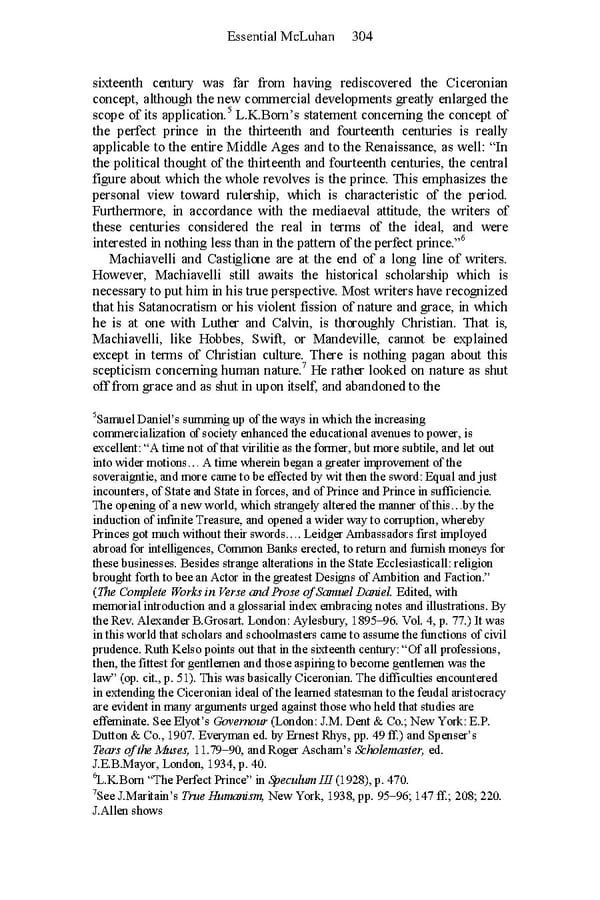Essential McLuhan 304 sixteenth century was far from having rediscovered the Ciceronian concept, although the new commercial developments greatly enlarged the scope of its application.5 L.K.Born’s statement concerning the concept of the perfect prince in the thirteenth and fourteenth centuries is really applicable to the entire Middle Ages and to the Renaissance, as well: “In the political thought of the thirteenth and fourteenth centuries, the central figure about which the whole revolves is the prince. This emphasizes the personal view toward rulership, which is characteristic of the period. Furthermore, in accordance with the mediaeval attitude, the writers of these centuries considered the real in terms of the ideal, and were 6 interested in nothing less than in the pattern of the perfect prince.” Machiavelli and Castiglione are at the end of a long line of writers. However, Machiavelli still awaits the historical scholarship which is necessary to put him in his true perspective. Most writers have recognized that his Satanocratism or his violent fission of nature and grace, in which he is at one with Luther and Calvin, is thoroughly Christian. That is, Machiavelli, like Hobbes, Swift, or Mandeville, cannot be explained except in terms of Christian culture. There is nothing pagan about this 7 He rather looked on nature as shut scepticism concerning human nature. off from grace and as shut in upon itself, and abandoned to the 5 Samuel Daniel’s summing up of the ways in which the increasing commercialization of society enhanced the educational avenues to power, is excellent: “A time not of that virilitie as the former, but more subtile, and let out into wider motions… A time wherein began a greater improvement of the soveraigntie, and more came to be effected by wit then the sword: Equal and just incounters, of State and State in forces, and of Prince and Prince in sufficiencie. The opening of a new world, which strangely altered the manner of this…by the induction of infinite Treasure, and opened a wider way to corruption, whereby Princes got much without their swords…. Leidger Ambassadors first imployed abroad for intelligences, Common Banks erected, to return and furnish moneys for these businesses. Besides strange alterations in the State Ecclesiasticall: religion brought forth to bee an Actor in the greatest Designs of Ambition and Faction.” (The Complete Works in Verse and Prose of Samuel Daniel. Edited, with memorial introduction and a glossarial index embracing notes and illustrations. By the Rev. Alexander B.Grosart. London: Aylesbury, 1895–96. Vol. 4, p. 77.) It was in this world that scholars and schoolmasters came to assume the functions of civil prudence. Ruth Kelso points out that in the sixteenth century: “Of all professions, then, the fittest for gentlemen and those aspiring to become gentlemen was the law” (op. cit., p. 51). This was basically Ciceronian. The difficulties encountered in extending the Ciceronian ideal of the learned statesman to the feudal aristocracy are evident in many arguments urged against those who held that studies are effeminate. See Elyot’s Governour (London: J.M. Dent & Co.; New York: E.P. Dutton & Co., 1907. Everyman ed. by Ernest Rhys, pp. 49 ff.) and Spenser’s Tears of the Muses, 11.79–90, and Roger Ascham’s Scholemaster, ed. J.E.B.Mayor, London, 1934, p. 40. 6 L.K.Born “The Perfect Prince” in Speculum III (1928), p. 470. 7 See J.Maritain’s True Humanism, New York, 1938, pp. 95–96; 147 ff.; 208; 220. J.Allen shows
 Essential McLuhan Page 310 Page 312
Essential McLuhan Page 310 Page 312